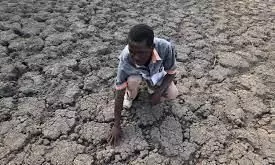
Nearly 70 million affected by severe drought in Southern Africa
text_fieldsA devastating El Niño-induced drought has left nearly 70 million people in Southern Africa facing severe hardships, according to a recent report by the Southern African Development Community (SADC).
The drought, which began in early 2024, has severely impacted crop and livestock production, leading to widespread food shortages and economic disruptions across the region.
The SADC, a regional bloc comprising 16 nations, convened a meeting in Harare, Zimbabwe, where heads of state discussed critical regional issues, including the worsening food security situation. Elias Magosi, the SADC executive secretary, highlighted that approximately 68 million people, or 17% of the region's population, are currently in dire need of assistance.
"The 2024 rainy season has been exceptionally challenging, with most of the region experiencing the negative effects of the El Niño phenomenon, marked by the delayed onset of rains," Magosi stated.
This drought is the worst Southern Africa has seen in years, exacerbated by the naturally occurring El Niño event - an abnormal warming of Pacific Ocean waters that disrupts global weather patterns - and the higher average temperatures resulting from greenhouse gas emissions.
Countries such as Zimbabwe, Zambia, and Malawi have already declared the hunger crisis a state of disaster, while Lesotho and Namibia have issued calls for humanitarian support.
In response to the crisis, the region launched an appeal in May for $5.5 billion in humanitarian aid.
However, according to Angola's President Joao Lourenco, the outgoing SADC chair, the amount raised so far falls significantly short of what is needed. Lourenco urged both regional and international partners to intensify their efforts to provide assistance to those affected by the drought.
The ongoing drought is a central issue at this year's SADC summit, alongside other concerns such as the ongoing conflict in the eastern Democratic Republic of Congo, which President Lourenco described as a major source of concern for the region.























